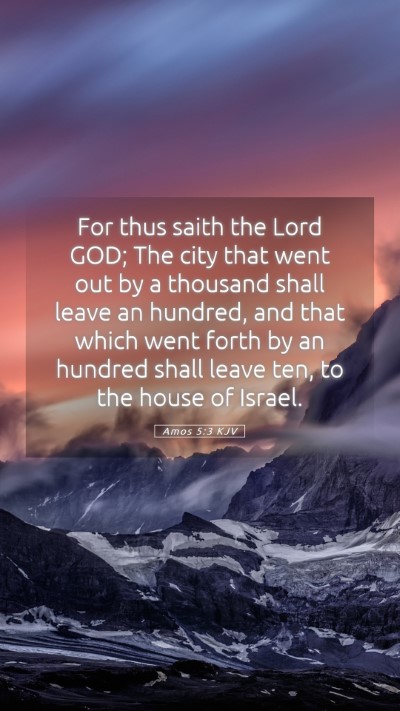Old Testament
Genesis Exodus Leviticus Numbers Deuteronomy Joshua Judges Ruth 1 Samuel 2 Samuel 1 Kings 2 Kings 1 Chronicles 2 Chronicles Ezra Nehemiah Esther Job Psalms Proverbs Ecclesiastes Song of Solomon Isaiah Jeremiah Lamentations Ezekiel Daniel Hosea Joel Amos Obadiah Jonah Micah Nahum Habakkuk Zephaniah Haggai Zechariah MalachiAmos 5:3 Meaning
What is the meaning of Amos 5:3?
For thus saith the Lord GOD; The city that went out by a thousand shall leave an hundred, and that which went forth by an hundred shall leave ten, to the house of Israel.
Amos 5:3 Bible Verse Meaning
Understanding Amos 5:3 - A Comprehensive Commentary
Bible Verse: Amos 5:3
"For thus says the Lord: 'The city that went out a thousand shall have a hundred left, and that which went out a hundred shall have ten left, to the house of Israel.'" (Amos 5:3 ESV)
Overview of the Verse
This verse from Amos emphasizes a theme of judgment and reduction, stating that those who once were numerous would face devastation to the point where only a remnant would remain. The prophet Amos delivers this message in a time when Israel was flourishing materially but morally decaying.
Insights from Public Domain Commentaries
Matthew Henry's Commentary
Matthew Henry explains that this verse reflects God's judgment against Israel for their unfaithfulness and idolatry. The imagery of waning numbers symbolizes not just physical loss but also spiritual death. For Henry, the concept of "going out" indicates a failed mission, as those who once ventured into battle shall return diminished, illustrating the futility of reliance on military strength over divine support.
Albert Barnes' Notes on the Bible
Barnes contextualizes this verse within the broader theme of divine retribution that characterizes Amos's prophecies. He notes that the loss indicated is not merely statistical but represents a severe downfall. The comparison of the thousands and hundreds illustrates the drastic impact of war and judgment, underscoring the reality that a nation without God would face devastation no matter their previous might.
Adam Clarke's Commentary
Adam Clarke provides an analytical approach, suggesting that the figure mentioned signifies the calamity that would befall Israel as a consequence of their sinful actions. Clarke emphasizes the dichotomy between the people’s confidence in their military power and the actual spiritual state of the nation. His commentary highlights the irony that those who boast in strength would find themselves ultimately left vulnerable, with only a small remnant surviving.
Key Themes and Interpretations
- Divine Judgment: The primary theme is God’s impending judgment on Israel due to their transgressions.
- Remnant Theology: This verse introduces the concept of a remnant, a recurring motif in the Bible, indicating that even after judgment, a portion of the faithful is preserved.
- Futility of Trusting in Strength: Amos warns against reliance on numbers and military power; this emphasizes spiritual health over physical might.
- Moral and Spiritual Decay: The loss of life is indicative of a deeper spiritual condition in Israel that led them away from God.
Application of the Verse
When studying this verse, it becomes clear that its applications extend beyond ancient Israel. In understanding Scripture, we are reminded of the enduring principles of divine justice and the importance of spiritual fidelity. Personal reflection involves assessing whether we rely more heavily on our own strength rather than trusting in divine providence. This is a pertinent reflection for today's believer, particularly in the face of societal moral decline.
Related Bible Verses
- Isaiah 6:13: "And though a tenth remain in it, it will be burned again, like a terebinth or an oak, whose stump remains when it is felled." This verse echoes the theme of remnant.
- Jeremiah 5:3: "O Lord, do not Your eyes look for truth? You have stricken them, but they have not grieved; You have consumed them, but they have refused to receive correction." Here, the idea of divine judgment is prevalent.
- Lamentations 3:22-23: "The steadfast love of the Lord never ceases; His mercies never come to an end; they are new every morning; great is Your faithfulness!" This highlights hope beyond judgment.
Conclusion
In conclusion, Amos 5:3 serves as a significant reminder of the consequences that arise from turning away from God's commandments. Understanding this verse through various commentaries allows for deeper insights into its meaning and implications in both historical and modern contexts. The exploration of Amos invites readers into profound scriptural analysis and highlights the importance of maintaining faithfulness amidst trials.
Further Study Resources
- Bible Study Groups: Engaging with peers can enhance understanding and interpretation of verses like Amos 5:3.
- Online Bible Study: Various platforms offer in-depth studies focusing on Old Testament prophecies and their relevance today.
- Bible Study Guides: Utilizing guides that delve into the historical context can aid in grasping the broader themes in Amos.


